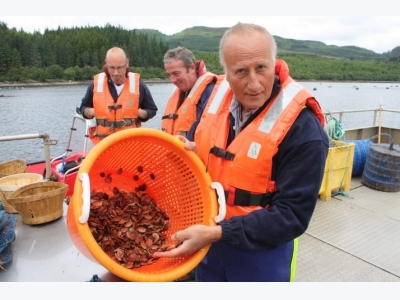Polyculture project takes shape

A new project designed to encourage the development of integrated multi-trophic aquaculture (IMTA) in western Europe is beginning to take shape.
Scotland's largest IMTA project, on Loch Fyne, features the co-culture of salmon, seaweeds, sea urchins, mussels, scallops, and oysters.
Called INTEGRATE, it aims to deliver tools to effectively increase competitiveness in Atlantic IMTA, unlocking sectorial green growth and improving the quality and public perception of aquaculture products. Eight organisations – from Spain, France, Ireland, Portugal and the United Kingdom – are involved.
The project seeks to improve the environmental performance of IMTA by making best use of the nutrient flow in aquaculture facilities by farming together species belonging to different trophic levels. The IMTA approach maximises resource efficiency while providing natural bioremediation at aquaculture farming sites.
Multi-trophic aquaculture systems are a circular economy paradigm. They contribute to making aquaculture more sustainable and competitive. However, despite being encouraged by European Union (EU) policies such as the Blue Growth Strategy, the Atlantic Action Plan and RIS3, there still are socio-economic, administrative and legal bottlenecks hampering the development of IMTA to its full potential. To overcome these, INTEGRATE is supporting cooperation between academia, the corporate sector and relevant authorities, thus strengthening collaborative networks in the field of Atlantic IMTA.
“INTEGRATE will deliver tools to effectively increase competitiveness in Atlantic IMTA, unlocking sectorial green growth and improving the quality and public perception of aquaculture products,” explains María del Mar Agraso, Technical Director at the Andalusian Aquaculture Technology Centre (CTAQUA), the project’s lead partner.
INTEGRATE aims to capitalise the available knowledge in order to turn the innovative solutions provided by IMTA into a technical, legal and administrative reality.
INTEGRATE is funded by the ERDF through the INTERREG Atlantic Area 2014-2020 Programme. CTAQUA (Spain) has joined forces with Agrocampus Ouest (France), the Scottish Association for Marine Science (United Kingdom), the Portuguese Institute for Sea and Atmosphere (Portugal), National University of Ireland Galway (Ireland), Irish Seaweed Consultancy (Ireland), ALGAplus (Portugal) and the Centre for Study and Promotion of Algae (France).
The three-year project expects to create an Atlantic IMTA platform for sectorial collaboration and three pilot actions to develop Atlantic IMTA technology and farming techniques. INTEGRATE shall capitalise its technical outcomes through best practice guidelines and the pilot actions will be open to academia and the aquaculture industry. The project will also launch Atlantic IMTA expert groups and dissemination events are envisaged to facilitate collaboration and knowledge transfer.
“We will assess the environmental impact of Atlantic IMTA, identify bottlenecks to IMTA development and design a suitable strategy for its industrial upscaling,” adds del Mar Agraso. “This project will provide us with the knowledge we need to start working alongside policy makers towards the creation of a regulatory framework that will support industrial IMTA in the European Atlantic Area”.
In late October 2017 CTAQUA hosted the project’s kick-off meeting in El Puerto de Santa María (Cádiz, Spain). At the event, the partnership reviewed all the tasks in the envisaged work plan and agreed on the work to be carried out in the next six months. Tania Afonso, INTEGRATE’s Project Manager at the INTERREG Atlantic Area 2014-2020 Joint Secretariat, explained to the partnership the practicalities of the contracting process, progress reporting and payment claims.
Có thể bạn quan tâm
 Vietnam, Norway share experience in aquaculture cultivation
Vietnam, Norway share experience in aquaculture cultivation Norway, the world’s leading seafood exporter, shared its experience in applying advanced technology for aquaculture farming and processing at a conference
 Norway seeks aquaculture projects
Norway seeks aquaculture projects The event discussed how to apply advanced technologies in the value chains of fisheries, aquaculture and processing in Việt Nam
 Invasive or imperative? South Africa’s quandary over Nile tilapia
Invasive or imperative? South Africa’s quandary over Nile tilapia Popular and adaptable, Nile tilapia are leading cichlid production worldwide. So why is the species banned in three of South Africa’s nine provinces?